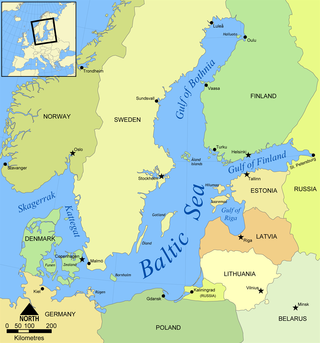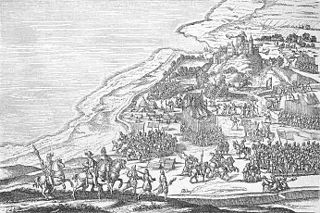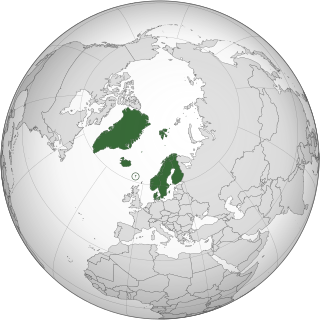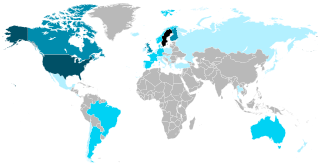
The Baltic Sea is an arm of the Atlantic Ocean that is enclosed by Denmark, Estonia, Finland, Germany, Latvia, Lithuania, Poland, Russia, Sweden and the North and Central European Plain.

The history of Latvia began around 9000 BC with the end of the last glacial period in northern Europe. Ancient Baltic peoples arrived in the area during the second millennium BC, and four distinct tribal realms in Latvia's territory were identifiable towards the end of the first millennium AD. Latvia's principal river Daugava, was at the head of an important trade route from the Baltic region through Russia into southern Europe and the Middle East that was used by the Vikings and later Nordic and German traders.

Scandinavia is a subregion in Northern Europe, with strong historical, cultural, and linguistic ties between its constituent peoples. In English usage, Scandinavia most commonly refers to Denmark, Norway, and Sweden. It can sometimes also refer more narrowly to the Scandinavian Peninsula, or more broadly to include all of Finland, Iceland, and the Faroe Islands.

The Scandinavian Peninsula is a peninsula located in Northern Europe, which roughly comprises the mainlands of Sweden, Norway and the northwestern area of Finland.

The Council of the Baltic Sea States (CBSS) is a regional intergovernmental organisation working on three priority areas:

The Nordic Council is the official body for formal inter-parliamentary Nordic cooperation among the Nordic countries. Formed in 1952, it has 87 representatives from Denmark, Finland, Iceland, Norway, and Sweden as well as from the autonomous areas of the Faroe Islands, Greenland, and Åland. The representatives are members of parliament in their respective countries or areas and are elected by those parliaments. The Council holds ordinary sessions each year in October/November and usually one extra session per year with a specific theme. The council's official languages are Danish, Finnish, Icelandic, Norwegian, and Swedish, though it uses only the mutually intelligible Scandinavian languages—Danish, Norwegian, and Swedish—as its working languages. These three comprise the first language of around 80% of the region's population and are learned as a second or foreign language by the remaining 20%.

The Baltic states or the Baltic countries is a geopolitical term, which currently is used to group three countries: Estonia, Latvia, and Lithuania. All three countries are members of NATO, the European Union, the Eurozone, and the OECD. The three sovereign states on the eastern coast of the Baltic Sea are sometimes referred to as the "Baltic nations", less often and in historical circumstances also as the "Baltic republics", the "Baltic lands", or simply the Baltics.

The terms Baltic Sea Region, Baltic Rim countries, and the Baltic Sea countries/states refer to slightly different combinations of countries in the general area surrounding the Baltic Sea, mainly in Northern Europe. The term "Baltic states" refers specifically to one such grouping.
The Northern Dimension (ND) is a joint policy between four equal partners - the European Union, Russia, Norway and Iceland - regarding the cross-border and external policies geographically covering Northwest Russia, the Baltic Sea and the Arctic regions, including the Barents Region. The ND Policy was initiated in 1999 and renewed in 2006. The Northern Dimension addresses the specific challenges and opportunities arising in those regions and aims to strengthen dialogue and cooperation between the EU and its member states, the northern countries associated with the EU under the European Economic Area and Russia. A particular emphasis is placed on subsidiarity, and on ensuring the active participation of all stakeholders in the North, including regional organizations, local and regional authorities, the academic and business communities, and civil society.

The Northern Seven Years' War was fought between the Kingdom of Sweden and a coalition of Denmark–Norway, Lübeck, and Poland–Lithuania between 1563 and 1570. The war was motivated by the dissatisfaction of King Frederick II of Denmark with the dissolution of the Kalmar Union, and the will of King Eric XIV of Sweden to break Denmark's dominating position. The fighting continued until both armies had been exhausted, and many men died. The resulting Treaty of Stettin was a stalemate, with neither party gaining any new territory.
The Council of Nordic Trade Unions (NFS) is a regional trade union federation. It represents 9 million members from 16 national trade unions in the Nordic countries of Europe. It was founded in 1972, and has close ties with the Baltic Sea Trade Union Network (BASTUN). The main task of NFS is to co-ordinate trade union activities in the Nordic countries, particularly with regard to employment, economic policy and different social issues. General Secretary, since 2014, is Magnus Gissler.

Sweden, formally the Kingdom of Sweden, is a Nordic country located on the Scandinavian Peninsula in Northern Europe. It borders Norway to the west and north, Finland to the east, and is connected to Denmark in the southwest by a bridge–tunnel across the Öresund. At 447,425 square kilometres (172,752 sq mi), Sweden is the largest Nordic country, the third-largest country in the European Union, and the fifth-largest country in Europe. The capital and largest city is Stockholm. Sweden has a total population of 10.5 million, and a low population density of 25.5 inhabitants per square kilometre (66/sq mi), with around 87% of Swedes residing in urban areas, which cover 1.5% of the entire land area, in the central and southern half of the country.

The Baltic Marine Environment Protection Commission is an intergovernmental organization governing the Convention on the Protection of the Marine Environment of the Baltic Sea Area. A regional sea convention and a platform for environmental policy making at the regional level, HELCOM works for the protection of the marine environment of the Baltic Sea. HELCOM consists of ten members – the nine Baltic Sea countries Denmark, Estonia, Finland, Germany, Latvia, Lithuania, Poland, Russia and Sweden, plus the European Union.

Göran Färm is a PES Member of the European Parliament (MEP) for Sweden. He was born on 17 October 1949 in Stockholm. His national party is the Swedish Social Democratic Party and sits on the Committee on Budgets. He is also part of the delegation for South East Europe.

The Nordic countries are a geographical and cultural region in Northern Europe and the North Atlantic. It includes the sovereign states of Denmark, Finland, Iceland, Norway and Sweden; the autonomous territories of the Faroe Islands and Greenland; and the autonomous region of Åland.
The first cabinet of Ingvar Carlsson was the cabinet of Sweden between 12 March 1986 and February 1990. The cabinet was formed as a direct consequence of the assassination of the incumbent prime minister Olof Palme on 28 February 1986. After which the Speaker of the Parliament, Ingemund Bengtsson, in accordance with the Constitution of Sweden discharged all ministers.

Swedes are a North Germanic ethnic group native to the Nordic region, primarily their nation state of Sweden, who share a common ancestry, culture, history and language. They mostly inhabit Sweden and the other Nordic countries, in particular Finland where they are an officially recognized minority, with a substantial diaspora in other countries, especially the United States.

Union of the Baltic Cities (UBC) is a voluntary, proactive network mobilizing the shared potential of the member cities for democratic, economic, social, cultural and environmentally sustainable development of the Baltic Sea region.

The Baltic Sea Parliamentary Conference (BSPC) was established in 1991 as a forum for political dialogue between parliamentarians from the Baltic Sea Region. BSPC aims at raising awareness and opinion on issues of current political interest and relevance for the Baltic Sea Region. It promotes and drives various initiatives and efforts to support a sustainable environmental, social and economic development of the Baltic Sea Region. It strives at enhancing the visibility of the Baltic Sea Region and its issues in a wider European context.

Norway–Poland relations are the diplomatic relations between the Kingdom of Norway and the Republic of Poland. Both nations enjoy friendly relations, the importance of which centers on mutual historical relations and the fact that more than 100,000 Polish citizens live in Norway on a permanent basis, Poles make up 2.10% of the Norwegian population. Both nations are members of the Council of Europe, Council of the Baltic Sea States, NATO, OECD, OSCE, United Nations and the World Trade Organization.

















